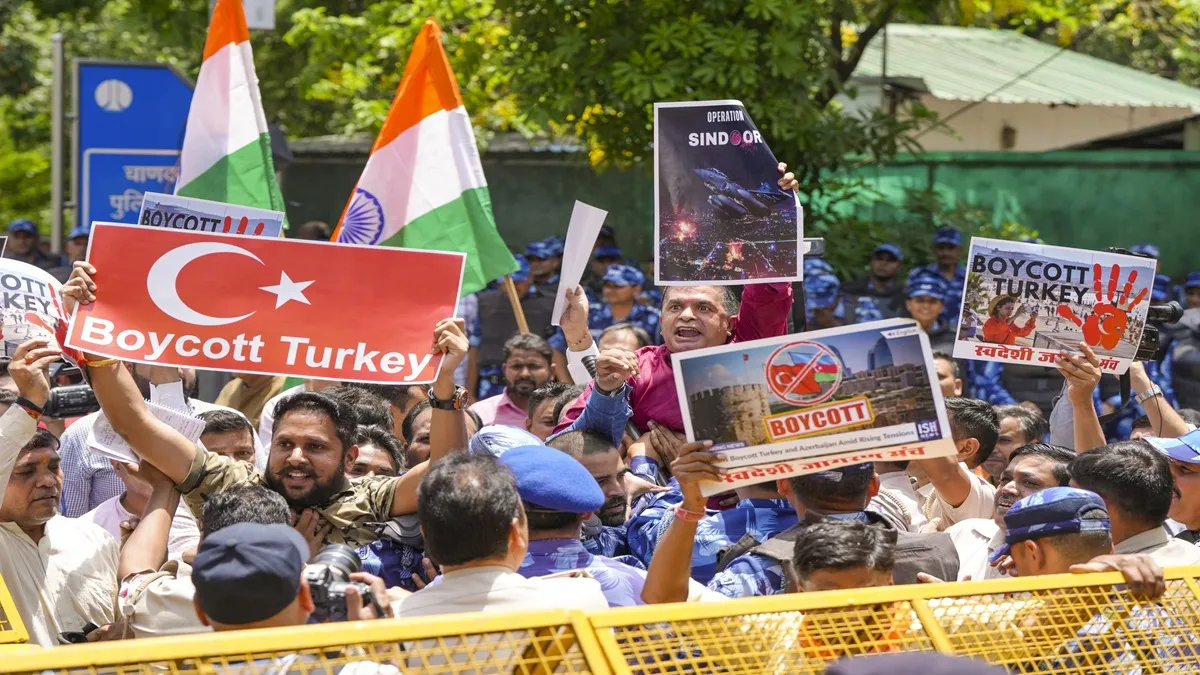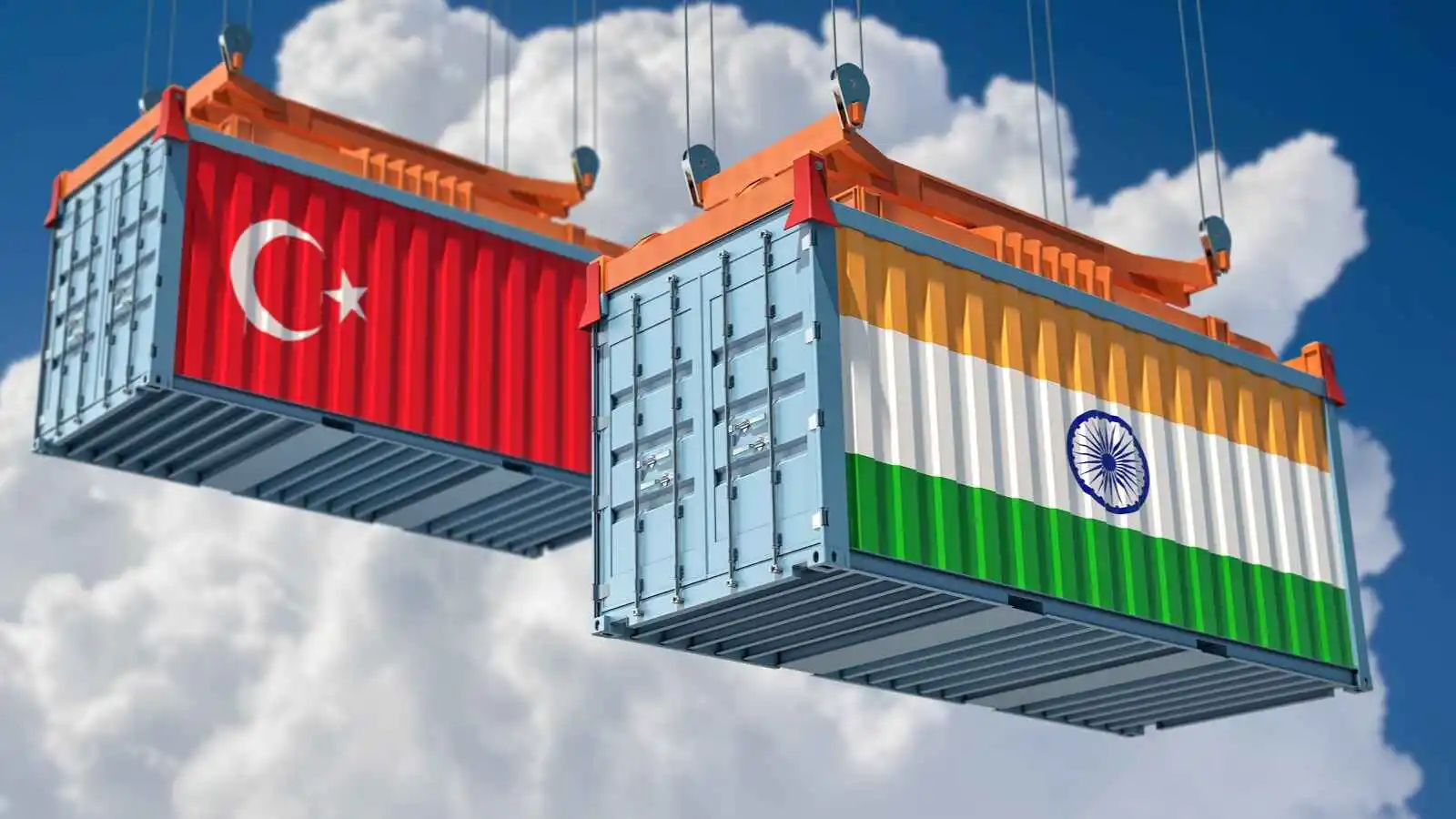How India-Turkiye Relations Reached a Sensitive Crossroads

“India’s relations with Turkiye have taken a hit owing to Ankara's support for Pakistan.”
Relations between India and Turkiye have witnessed significant fluctuations in the last decade, following decades of calm and moderate diplomatic openness.
The period 2019-2022 could be counted as the lowest point in India-Turkiye relations when the two countries waged a massive media campaign against each other. This was in the wake of the revocation of the special status accorded to Jammu and Kashmir within the Indian federal structure.
Indian anger over Turkiye's recent support for Pakistan is no longer limited to the diplomatic dimension; it has morphed into a broad boycott encompassing trade, tourism, education, media, and the entertainment industry.
The boycott calls against Turkiye gained momentum after reports emerged of Turkish drones being used by Pakistan against India.
Although the impact of this boycott has yet to be fully felt in Turkiye, it could have significant economic consequences for both countries.
Total Boycott
Although Turkiye seeks to maintain balanced relations with both India and Pakistan, Ankara's strategic rapprochement with Islamabad has placed it at the mercy of diplomatic winds and escalating tensions with New Delhi.
Ankara maintains relatively cordial relations with New Delhi, but Turkiye's public support for Pakistan, such as combat equipment and military hardware, during the recent tension with India led to widespread resentment among the Narendra Modi government and the Indian public.
The Indian-Turkish dispute began to escalate after Ankara announced, on April 23, its formal rejection of New Delhi's suspension of the Indus Waters Treaty with Islamabad, describing it as a unilateral action that could further inflame the conflict between the two countries.
On May 17, the Indian Ministry of External Affairs suspended trade and educational ties with Turkiye and halted Turkish flights to India as part of a review of its international relations with all countries that question India's sovereignty over Jammu and Kashmir.
On May 22, the Indian Ministry of External Affairs called on Turkiye to urge Pakistan to stop supporting terrorism and dismantle its associated systems.
Despite Ankara's calls for calm and promoting diplomatic dialogue between the two countries, New Delhi described the Turkish position as biased and hostile.
Following these developments, India witnessed a total boycott of Turkish goods and services, and the hashtag #BoycottTurkey started to trend in India.
India's two leading e-commerce platforms, Myntra and Ajio, have pulled several imported Turkish brands from their stores, including Mavi, LC Waikiki, Koton, and Trendyol.
Calls have intensified for major Indian companies operating in the Turkish market to suspend their investment projects there.
India's civil aviation ministry also revoked the security clearance of the Turkish aviation company Celebi, which provides ground services at major Indian airports, on grounds related to national security.
In the same context, the Indian Institute of Technology Bombay (IIT Bombay) announced on May 18 the suspension of all its agreements with Turkish universities.
Private educational institutions, such as Jawaharlal Nehru University, Jamia Millia Islamia and Chandigarh University, have severed their academic ties with a large number of Turkish universities, paving the way for an official academic boycott.
New Delhi has also used tourism cooperation as a leverage and political message to pressure Ankara on their contentious issues.
According to official Indian data, more than 15,000 reservations from the Indian state of Uttar Pradesh to Turkiye and Azerbaijan have been canceled in the past few days.
Major Indian film unions, such as the Federation of Western India Cine Employees (FWICE) and the All Indian Cine Workers Association (AICWA), have called for a ban on filming in Turkiye.
So far, the Indian government has not issued any official decision supporting the boycott, but it has not taken any action to halt it.
Ankara has also not issued any official response to the Indian boycott campaign, despite its scope and impact on several vital sectors.

Strategic Measures
India-Turkiye relations have experienced periodic tensions, punctuated by several attempts at rapprochement.
Turkiye was among the first countries to recognize Pakistan after its independence in 1947 and established diplomatic relations with it in 1948.
Relations between Ankara and New Delhi remained largely neutral during the Cold War, with India joining the Non-Aligned Movement, while Turkiye firmly aligned with the Western bloc as a member of NATO.
However, the relation between the two countries gained momentum in the post-Cold War period, particularly through economic and cultural exchanges.
With Erdogan's rise to power and his increasing focus on a new foreign policy model that seeks to expand Turkish influence in the Islamic world, Ankara's approach to New Delhi began to reflect an ideological and geopolitical reassessment.
Subsequently, India took strategic countermeasures to balance Turkish influence by strengthening its alliances in the Eastern Mediterranean and the South Caucasus, two geopolitical regions of importance to Turkiye.
India also strengthened its diplomatic relations with Greece, a historical rival of Turkiye.
In 2024, India and Greece signed a strategic partnership agreement to enhance cooperation in the defense and energy sectors, and the two countries' militaries conducted joint military exercises in the Mediterranean on April 4, 2025.
In addition, India has developed strategic relations with “Israel”, the UAE, and France, countries that also view Turkish regional activity with suspicion.
In the coming period, India will likely intensify cooperation with Turkiye's regional adversaries, particularly Greek Cyprus, and expand its military partnership with Armenia.
Despite the current widening of the dispute between India and Turkiye, Ankara appears keen to prevent it from reaching an unprecedented level, making it difficult to contain its negative repercussions.
Hence, Turkiye is likely to adopt flexible policies in its dealings with India in the coming period.
It is worth noting that Turkiye has recently been careful to avoid raising the Jammu and Kashmir issue in international forums, especially at the United Nations, to avoid provoking India's anger.
However, India's actions could undermine opportunities for trade cooperation with Turkiye and may even push New Delhi to withdraw from the goodwill agreement signed with Ankara in 2024, which could negatively impact the two countries' efforts to increase bilateral trade to $20 billion annually.

Worrying Support
Recent years have seen the signing of several defense agreements between Turkiye and Pakistan, most notably drones, submarines, and warships.
The acceleration of these partnerships raises Indian concerns about the transfer of advanced military technologies, which could be used in border conflicts or to support anti-India non-state groups.
It is clear that Turkish support for Pakistan could contribute to fueling Hindu nationalism within India, which could prompt the Indian government to take harsher measures against the Muslim population of Kashmir.
This could exacerbate internal tensions and increase the likelihood of renewed military escalation on the Pakistani border.
Finally, Pakistan, with Turkish support, may seek to expand its alliance to include countries such as Iran and Qatar.
This could create a geopolitical axis that limits India's regional influence and could lead to the formation of new maps of influence that would impact the military and political balance in South Asia.
It is worth noting that India is not a major trading partner for Turkiye, as Turkiye imports from India six times more than it exports to it.
Turkiye also has the ability to easily compensate for the losses resulting from the boycott, according to Yeni Safak newspaper.
Even before the recent disagreement, India had terminated a $2 billion shipbuilding consultancy agreement with Turkiye's Anadolu Shipyard.
The deal involved constructing five Fleet Support Ships for the Indian Navy at India's Hindustan Shipyard, with technology and engineering support from Anadolu.

In this regard, political analyst Yusuf Katipoglu pointed out in a statement to Al-Estiklal that relations between India and Turkiye are currently at a sensitive crossroads.
He explained that “the Indian escalation is more of a political message directed at Turkiye than a direct economic impact, amid anticipation of Ankara's handling of this new crisis.”
“Despite the absence of a direct military threat between the two countries, ideological and diplomatic tensions carry the potential for escalation that could manifest in complex regional issues,” he added.
He concluded that “India is one of the world's major economic powers and has been experiencing the highest growth rates for years, but Turkiye believes that its principled positions on the rights of states and peoples cannot be subject to trade considerations alone.”
Sources
- Turkey faces Indian backlash over Pakistan ties
- Indians urge Turkey boycott amid regional tensions
- Why Turkiye Chose to Side With Pakistan Over India
- The Bitter Taste of ‘Turkish Delight’: Analysing India-Turkey Relations in Contemporary Times
- The winds of the India-Pakistan conflict blowing in Turkey [Turkish]












